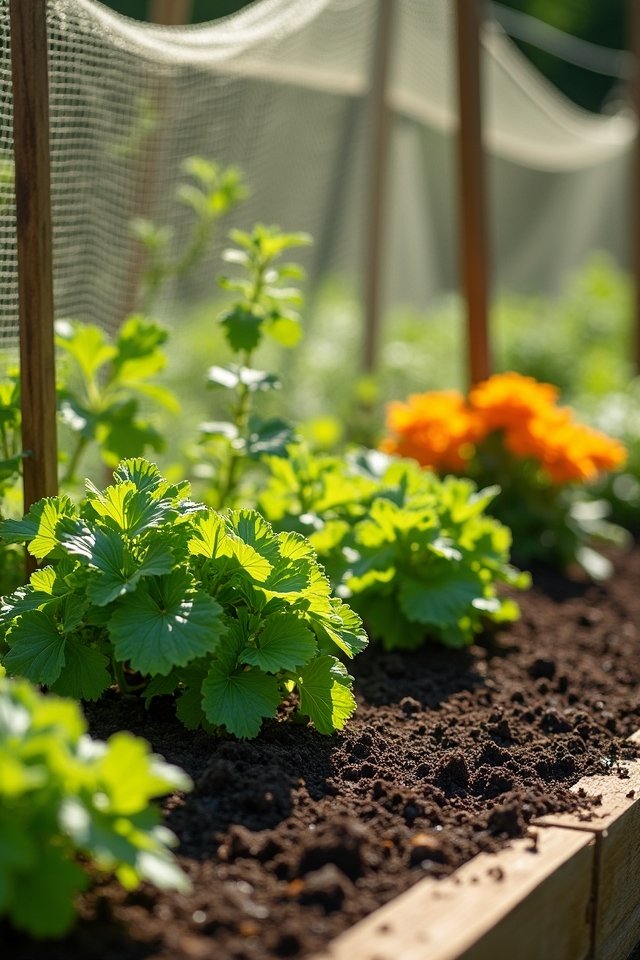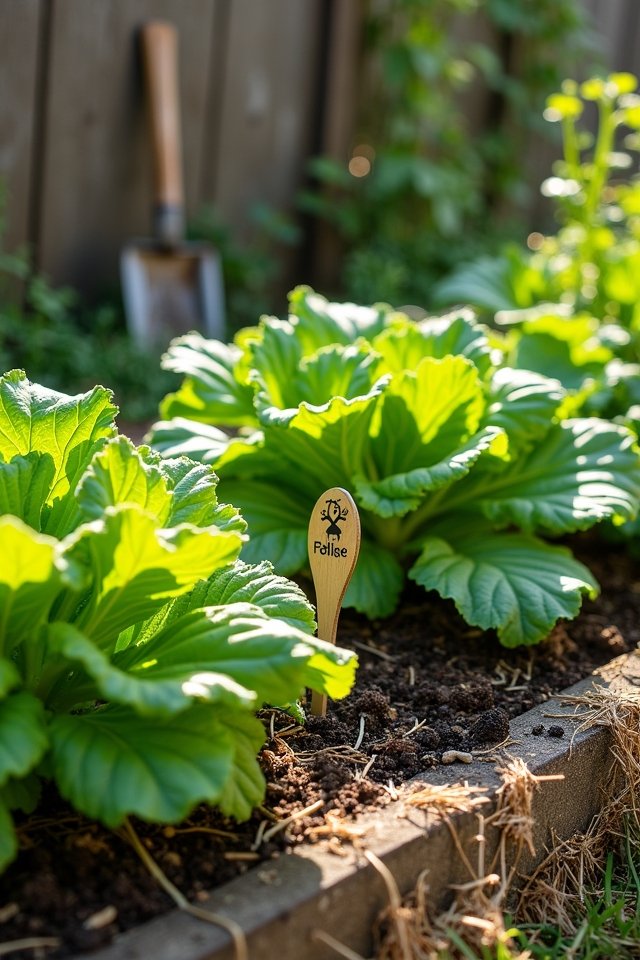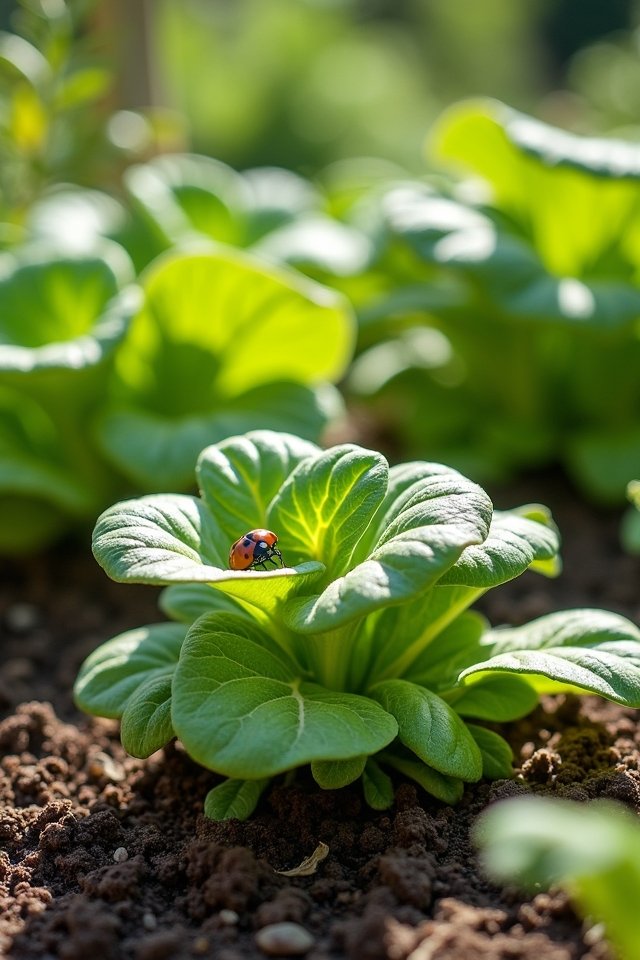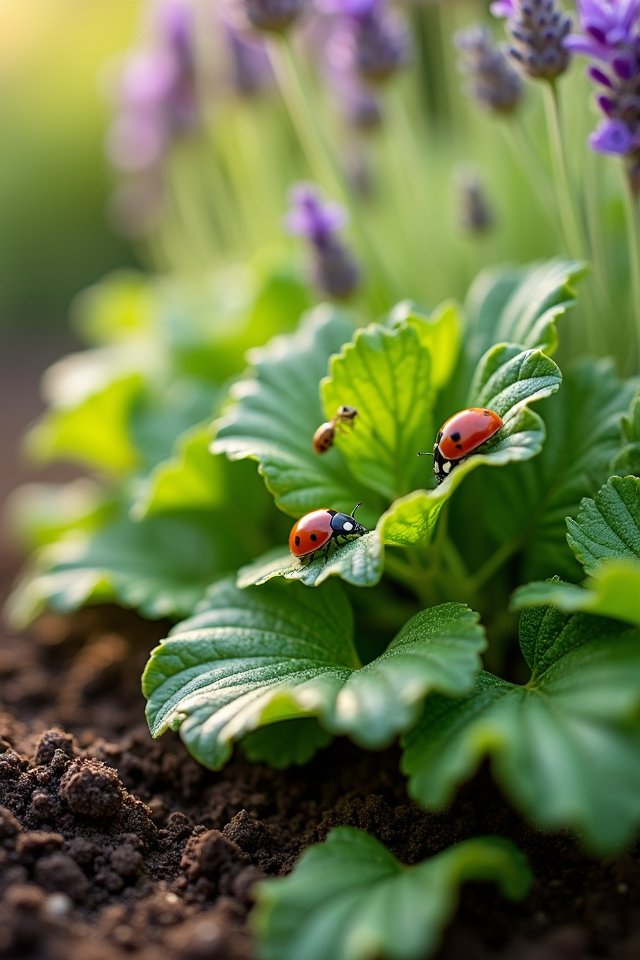The evolution of organic pest control in raised beds combines ancient wisdom with modern techniques, creating a vibrant garden ecosystem! You’ll find everything from garlic sprays that send pesky aphids running to companion planting with marigolds that keeps your tomatoes safe. It’s like throwing a garden party for beneficial insects! With smart monitoring apps and eco-friendly solutions blossoming, your raised bed will thrive! Curious about tackling challenges or discovering new innovations? There’s plenty more to explore!
Historical Approaches to Pest Management

When you immerse yourself in the world of pest management, it’s fascinating to discover how our ancestors tackled those pesky garden invaders! They didn’t have the luxury of modern solutions like we do today. Instead, they relied on traditional methods and ancient practices that now seem both quirky and clever! Imagine planting garlic to repel aphids, or using diatomaceous earth, a fine powder that’s as effective as tiny ninja warriors against unwanted pests! They handpicked beetles or created traps from simple materials, which were resourceful and quite effective! After all, necessity is the mother of invention! So, as you explore innovative strategies, remember the wisdom of the past and let those historical approaches inspire your own pest management journey!
The Rise of Organic Practices

As you immerse yourself in the garden world, it’s hard to ignore the blooming popularity of organic practices! These sustainable agriculture methods bring a fresh breeze of natural alternatives to your backyard. Have you tried using companion planting? Pairing marigolds with your tomatoes not only wards off pesky pests but adds a splash of color! And ditching harsh chemicals? That’s a win-win for you and the environment! More gardeners are embracing innovative techniques like crop rotation and beneficial insects, making their raised beds thriving ecosystems. Imagine watching ladybugs munch on aphids while you sip your morning coffee! Isn’t it exciting to nurture your plants with materials as friendly as nature itself? Engage in organic gardening, and let your garden flourish sustainably!
Key Principles of Organic Pest Control

Organic gardening isn’t just about what you grow; it’s also about how you protect those precious plants! To keep pests at bay, adopt cultural practices like crop rotation and companion planting. Think of your garden as a vibrant community—mixing plants invites natural friends to join the party! Natural repellents come to the rescue, too. Garlic spray can turn pesky invaders away, just like a bouncer at a club. You’ll love using neem oil; it’s a powerful ally in your organic arsenal! By keeping your garden thriving through biodiversity, you’ll create a balanced ecosystem that’s tougher than any bug. So, immerse yourself in these principles and watch your plants dance joyfully, free from synthetic chemicals! Isn’t that what gardening is all about?
Techniques for Integrated Pest Management

Though pests may seem like a pesky part of gardening, you can tackle them head-on using Integrated Pest Management (IPM) techniques that are both smart and effective! One powerful strategy is companion planting. Just imagine basil keeping pesky flies away from your tomatoes, like a loyal bodyguard! You can also make use of natural repellents, like neem oil or garlic spray; they smell strong but are gentle on the environment. Regularly monitoring your plants for signs of trouble is essential, too! Think of it as giving your garden a health check-up. By combining these innovative methods, you’ll create a harmonious ecosystem, keep your plants healthy, and enjoy a how-to guide that’ll make pests think twice before crashing your gardening party!
Beneficial Insects and Their Roles

While you might not see them buzzing around your garden all the time, beneficial insects are like tiny heroes on a mission! These little wonders, such as ladybugs and lacewings, swoop in to feast on pesky pests like aphids. Imagine a bustling team working in perfect insect symbiosis, where everyone plays their part to keep your garden thriving! Plus, by attracting pollinators like bees and butterflies, you’re not just warding off trouble; you’re enhancing your plants’ beauty and productivity. So, why not create a welcoming environment for these helpful critters? Plant diverse flowers and avoid harmful chemicals, and you’ll encourage pollinator attraction in your raised beds. These tiny allies can make a big difference, ensuring your garden flourishes with life!
Common Challenges in Raised Bed Gardening

When you plunge into raised bed gardening, you’ll quickly discover that it’s not all sunshine and butterflies—sometimes it’s a battle against the elements! One common challenge is ensuring proper soil drainage. You don’t want a swampy mess ruining your beautiful plants, do you? To tackle this, mix in some coarse sand or gravel. Next up—pest identification. These little nuisances might sneak up on you when you least expect it! By knowing what to look for, like aphids or caterpillars, you’ll outsmart them before they wreak havoc. Stay alert, keep your garden thriving, and remember: every challenge is just a chance to innovate! Welcome the learning, and soon you’ll know how to make your raised bed a pest-free paradise!
Future Trends in Organic Pest Management

As you plunge into the exciting world of organic pest management, you’ll find that the future shines bright with innovation and creativity! With sustainable innovations and technological advancements leading the charge, you’ll love what’s coming. Here are some trends to watch:
- Smart Pest Detection: Imagine using apps that analyze your garden’s health and alert you to potential pests before they invade!
- Biological Controls: Beneficial insects will play a larger role, promoting a balanced ecosystem.
- Eco-friendly Barriers: Innovative materials for raised beds can deter pests without harming them.
- Data-Driven Solutions: Analyzing trends through AI will tailor pest management strategies to your garden’s needs.
Exciting, right? Welcome these changes, and your gardening adventure will flourish like never before!
Frequently Asked Questions
What Are Some Common Organic Pest Control Products Available Today?
When it comes to pest control, you’ve got some amazing organic options at your fingertips! Neem oil applications are like nature’s shield, effectively repelling pesky insects while promoting plant health. Then there’s diatomaceous earth usage—imagine a fine, powdery dust that’s lethal to soft-bodied critters! Sprinkling this magic dust can send those pests packing! So, why not try these innovative solutions? Your plants will thank you, and the environment will cheer too!
How Can I Identify Beneficial Insects in My Garden?
To identify beneficial insects in your garden, look for colorful pollinators like ladybugs and lacewings—they’re like tiny superheroes fighting off garden pests! You’ll spot them munching on aphids and caterpillars or fluttering around your blooms. Keep an eye out for those delicate, shimmering wings. If you see them, give yourself a high-five! They’re essential for a healthy ecosystem. Remember, a diverse insect crew can make your garden thrive like a blossoming paradise!
Are There Any Pests That Organic Methods Cannot Control?
While organic methods are fantastic, they aren’t miracle workers. Some pests, like the notorious corn earworm, can develop pest resistance, making them tougher to control. You might feel like you’re in a bug battle! Plus, certain widespread issues like aphids might grow resilient to your favorite organic sprays. It’s like fighting a sneaky ninja! Staying informed and adapting strategies is essential—embrace creativity in your pest-fighting quest! You’re now a garden warrior! 🌱✨
What Cost Considerations Should I Keep in Mind for Organic Pest Control?
You might think organic pest control is too pricey for your garden, but let’s reconsider! When planning your budget, consider long-term savings—like growing healthy plants without pesticides! Conducting a cost-benefit analysis can help! Maybe you’ll spend a bit more on neem oil or beneficial insects, but think of the thriving, vibrant garden you’ll enjoy! It’s like investing in a cozy future—your plants will thank you, and so will your taste buds!
How Do Weather Conditions Affect Organic Pest Management Strategies?
Weather’s like a fickle friend, isn’t it? Those unpredictable weather patterns can really shake up your organic pest management! Seasonal changes might mean you need to rethink your strategies. For example, a sudden dry spell could dry out beneficial insects or invite pesky bugs like aphids. When rainstorms roll in, pests can thrive with new growth bursts! Stay aware, adapt fast, and let nature show you the way to keep that garden buzzing beautifully!


